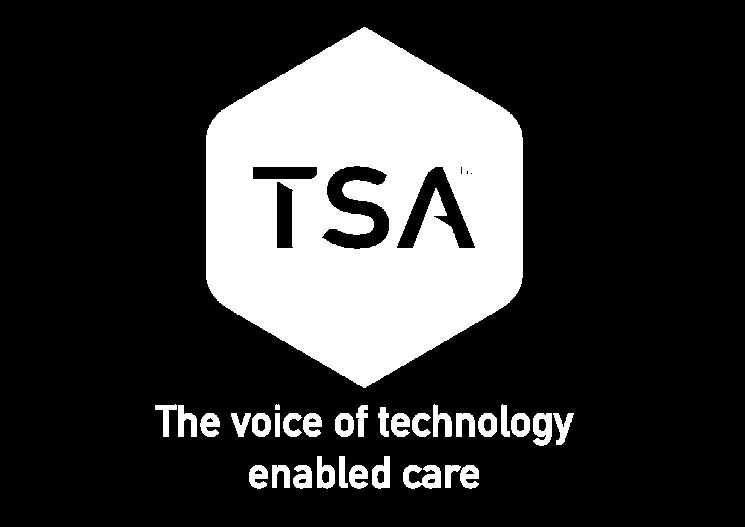Protecting telecare users in a digital world
National Campaign Launched
Driving digital success: Harnessing innovation and mitigating risk

Spending Review 2025: What it Means for Technology-Enabled Care
July/August 2025

National Campaign Launched
Driving digital success: Harnessing innovation and mitigating risk

Spending Review 2025: What it Means for Technology-Enabled Care
July/August 2025

TSA Chief Executive
In this issue we’re celebrating the wonderful members of our Sector Risk and Innovation Group (SRIG) and its five innovation and challenge groups.
For the past nine months these TEC experts have tackled central issues facing our sector: cyber security, resilience, interoperability, skills and barriers to growth.
Through research, analysis and lots of handson hard work, they’ve developed a bank of practical tools to support members to channel opportunities and mitigate risks. Find out about these resources on pages 3-7.
TSA’s drive to improve skills and manage risks in our valued TEC workforce goes from strength to strength. In addition to our hugely popular Virtual Home, we have just launched a National TEC Training Model with three core TEC modules. Read more on page 8.
Over recent weeks, a national advertising campaign has brought telecare to the TV, radio, social media and newspapers, raising awareness of the digital switchover amongst people who use TEC, their families and carers.

Want to know more about this campaign and spread the word to the people you support? Head to page 10, where you’ll find links to a partner pack with assets including downloadable posters, video clips and social media cards.
The knowledge and expertise we’ve gathered during this landline switchover work is now being applied to the 2G and 3G switch off. TSA is working with the Department for Science, Innovation and Technology (DSIT) on a 2G and 3G switch off steering group, representing the TEC sector. Watch this space for more updates.
De-risking services and systems is a golden thread running through all these projects. I’ve been reflecting recently that the Quality Standards Framework wouldn’t be the robust, independent, UKAS-accredited assurance system it now is, helping to mitigate risk and harness opportunities, if it wasn’t for the feedback from you, our members.
It’s your views on the challenges and innovations around TEC safety and effectiveness that have helped to shape QSF. Please keep this feedback coming!
I hope you enjoy this issue!

In July last year, TSA refreshed its governance structure and launched what has now become an invaluable initiative - the Sector Risk and Innovation Group.
SRIG, as it’s known, supports TEC organisations to strike that important balance between innovation and risk, assessing and addressing the critical issues and opportunities our industry will face over the next two to three years.
Expert guidance, tools and resources are developed, supporting TEC organisations to confidently and responsibly navigate these risks and drive sustainable success.
Since October 2024, five Innovation and Challenge Groups (ICGs) - made up of experts who either work in TEC or draw on it themselves - have been tackling some



of our sector’s biggest issues: cyber security, resilience, interoperability, skills and barriers to growth.
It’s worth noting that the first three of these groups have a common thread – digital resilience and seamless operation – issues vital for our sector.
Our Innovation and Challenge Group members have given up their time, their knowledge and their experience to deliver hands-on, practical outputs that can be used by our sector. Their commitment has been substantial, and we want to thank each and every one for their valuable contributions, sharing exactly what they’ve been working on and how organisations are using the outputs:











This Innovation and Challenge Group conducted an evaluation of cyber incidents in the TEC sector and identified some significant risks and opportunities for improvement. A specialist team was recruited to undertake further assessments and develop mitigations, with templates being developed for key areas including incident response, communications planning, defining roles and post-incident review reports. These will be published shortly.
Over coming months, this group will recommend amendments to the Quality Standards Framework (QSF), including security policy reviews and incident management standards. Cyber security awareness across the sector will be promoted and incident management support developed. Updates on this work can be found here
• Chair: Stuart Ellis Taking Care
• Sonia Calder, 2ic-care
• Gary Clark, Careium
• Will Edgell NRS
• Andreas Fransson, Careium
• David Jack, Tunstall
• Richard Keyse, 2ic-care
• Helen Loveday TEC Quality
• Terry Meredith, iOnline
• Chris Pugh, TEC Quality
• Emma Quest NRS
• Herman Thom iOnline
• Emily White Chiptech
Following needs identified within TSA’s membership, this expert group have carried out a thorough deep dive assessment of risks relating to telecare, internet of things (IoT) and digital alarm units (DAUs). This work covers systems, products, comm methods, monitoring platforms, middleware, remote call handling, and new critical and low priority alert management.
Over 300 risks were identified, with useful and accessible mitigation guidance being developed. More information on this can be found here
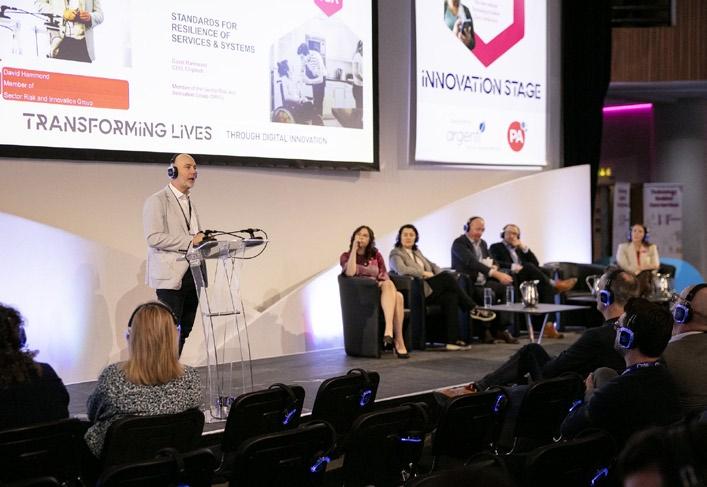
Over recent years, TSA risk surveys, research from Technology for our Ageing Population: Panel for Innovation (TAPPI) and the TEC Action Alliance have all highlighted sector concerns around inadequate integration of TEC systems with wider health and care services, and the limited interoperability between TEC products. From the perspective of people and families using TEC, this has been described as the need for ‘seamless’ systems and devices.
This SRIG group has successfully addressed these concerns, informing commissioners and supporting providers to deploy digital services in a more integrated way.
Interoperability information has been published on the TSA website and an interoperability matrix has been launched.
TSA actively participates in numerous British and European standards committees where both national and international standards are reviewed and shaped. These committees now also include representation from key SRIG members, helping to ensure that emerging risks and developments within the TEC Sector are reflected in the evolution of these standards. The Quality Standards Framework (QSF) - the only UKAS accredited scheme, tailored specifically for the TEC Sectorintegrates both British and European standards, reinforcing its relevance and rigour.
• Chair: Paul Shead Enovation UK
• Carl Atkey, Appello
• Kevin Avery Tunstall Healthcare
• Richard Bailey Mobius Networks
• Paul Bennett Network Communication Systems
• Jörgen Björkner, iotcomms.io
• Saeed Choudhary, Legrand Care
• Gary Clark Careium
• Julian Edge Chiptech
• Stuart Ellis Taking Care
• Chair: David Hammond, Chiptech
• Richard Bailey, Mobius Networks
• Julian Edge, Chiptech
• Richard Hosier Everon
• Ian Nicholson Enovation
• Rebecca Simmons
TEC Cymru
• Max Stevens CSL

• Charlotte Findlay, TSA
• David Gross, Access Group
• Trevor Hoggard Legrand Care
• Richard Hosier, Everon
• Andreas Hultén Tunstall Healthcare
• Lance Kenworthy Tunstall Healthcare
• Oskar Lampel Skyresponse AB
• Romain Miquel Attentive
• Tim Mulrey TSA
• Ian Nicholson Enovation
Tracy Harrison emphasised the importance of this work:
“The Technology Enabled Lives framework, informed by the TSA, is reflective of the evolving nature of technology, and delivers a reliable and compliant route to market.
Our expert team of account executives use the interoperability matrix in their meetings with our members to help chart their procurement route - an important step to embrace innovation but also mitigate risk.”
Tracy Harrison, Chief Executive of Northern Housing Consortium & NHC Procurement
• Peter Reed-Forrester, Yorbl
• Carl Ryan, Essence Smartcare
• Danny Shephard, 2iC-Care
• Max Stevens CSL
• Jordon Straw Total Integrated Solutions
• Chris Stuart TeleAlarm Europe
• Peter Swales, Possum Limited


SRIG members have identified multiple barriers to scaling TEC. One key area is proactive and preventative TEC.
Financially, many local authorities lack the modelling and evidence required to build strong investment cases that convince finance leads and system partners. In terms of service design, there is uncertainty about what a modern proactive TEC model should look like, and how to implement it effectively.
Culturally, the shift requires changes in commissioning, workforce skills and local partnerships, which can feel complex and resource intensive without clear guidance.
To address these issues TSA partnered with ADASS to establish a commission to unlock the power of proactive and preventative care services.
Over recent months, with the voices of over 100 people, we have successfully built an evidence case and practical Blueprint outlining how to make the argument around proactive and preventative care - published in April 2025 (in conjunction with ADASS at their Spring Seminar).
• Commission Co Chair:
Sir David Pearson Chair, TEC Quality
• Commission Co Chair: Melanie Williams, President, ADASS, Executive Director for Adult Social Care and Public Health, Nottinghamshire County Council
• Rich Amos Lived Experience Advisor
• Rowan Atkins Associate, TSA
• Paul Berney TSA Associate
• Sally Burlington Chief Executive Officer, ADASS
• Gavin Butler Adult Principal Social Worker Network Co-chair and Senior Manager Mental Health, Principal Social Worker (Adults), Cheshire West and Chester Council
• Alexis Chappell, Strategic Director of Adult Care and Wellbeing, Sheffield City Council
• Mike Chard Director of Policy and Analysis, ADASS
• Chris Donnelly Managing Director, Legrand Care UK
• Nathan Downing Director of Consultancy Services, TSA
• Debra Edwards, Lived Experience Advisor
• Justene Ewing Vice President Health and Care, CGI
• Dr Clenton Farquharson CBE Associate Director, Think Local, Act Personal (TLAP)
• Nerys Hebdon, Head of TEC Customer Enablement, The Access Group
• Emily Holzhausen CBE, Director of Policy and Public Affairs, Carers UK
• Joe McLoughlin Managing Director, Careium
• Mark Moulding, Head of External Affairs and Policy, Skills for Care
• Chris Nisbet, Transformation Programme Lead, Warrington Borough Council
• Tania Openshaw, Project Manager, TSA
• Angela Osei-Owusu Principal Occupational Therapist, Enfield Council
This hands-on guide is now being used across the local authority and social care sector. Read more here
Over coming months, this ICG is looking into ways to test the Blueprint, extend it (in Phase 2) and develop other marketshaping actions. More to be announced shortly. If you are a local authority, hoping to understand how you can maximise the benefits of the Blueprint, here are some pointers:
• Completely new to these services? You and your colleagues can join a free webinar on ‘The Art of the Possible with Proactive & Preventative Services’. Register your interest here
• At the start of your journey and want to explore the potential of Proactive & Preventative Services in your local authority? Contact us to book a half-day workshop with TSA
• Already certain you’ll use the blueprint to launch/ develop your services? Join our new community of practice bringing together other councils using the blueprint. Register your interest here
• TSA has developed consulting packages to support and guide you on using the Blueprint. Want to know more and discuss how TSA can support you? Email admin@tsa-voice.org.uk and we will be in touch.
• Stuart Parsons Director Consulting Services, CGI
• Stephen Peddie National Care and Health Improvement Adviser for Digital Technology in Adult Social Care, Partners in Care and Health (PCH), a partnership between the Local Government Association and the Association of Directors of Adult Social Services
• Sarah Roxby Executive Director of Housing, Vico Homes
• Alyson Scurfield, Chief Executive Officer, TSA
• Peter Skinner Programme Director, Digitising Social Care (DiSC), NHS England
• Caroline Williams, Director of Adult Social Care, Warrington Borough Council
• Alan Williamson Head of Engagement and Communications, TSA
If you want to get involved with SRIG and its different Innovation and Challenge Groups, then we’d love to hear from you. Contact admin@tsa-voice.org.uk for more information.
There are times when TSA and TEC Quality are called upon to give expert insight to inform coroner’s court investigations. This work, along with feedback from TSA’s membership, further highlighted the need for training and education.
This Innovation and Challenge Group ensures staff are CPD trained consistently across the TEC sector to professionalise essential roles, and in doing so, improve retention and recruitment of staff.
To date, the group has led the development of a National TEC Training Model (including three core TEC modules), along with the roll out of the model to the TEC Sector via the Quality Standards Framework.

The project was showcased at ITEC in a session alongside Skills for Care with the opportunity for feedback. A formal consultation process with QSF certified organisations concluded in April and the learning management system training for organisations is now complete. TEC service providers are currently being set up on the learning portal.
If you want to hear more about this new initiative, please contact: admin@tecquality.org.uk
This important work links with the QSF: it is a mandatory audit requirement to achieve accreditation from June 2025 onwards.
• Chair: Helen Loveday TEC Quality
• Anthony Anderson TEC Quality
• Lisa Brumwell, Independent advisor
• Stuart Cole Mole Valley Life
• Bradley Coupar, Sutton Council
• Christopher Duckling-Breed Sunderland Council
• Julie Stone, TSA
Over recent months, TEC Quality have been developing a brand-new element to the Quality Standards Framework (QSF) that will give certified organisations a further advantage within the sector.
The Quality Standards Framework is a set of outcomebased standards that supports organisations providing TEC products and services, based on the principles of Quality, Safety, Innovation and Continuous Improvement. With greater use of TEC services and digital solutions by service users, carers and families, the need for quality has become a “must have” in keeping people safe. The scheme is run by TSA’s independent assurance partner, TEC Quality, and is the only UKAS accredited scheme for technology enabled care in the UK.
The QSF turns compliance into credibility, raising the bar for safety, trust, and performance across the entire TEC ecosystem
We are pleased to announce that our new CPD accredited workforce training platform is now live.


It builds trust and confidence across the sector
Quality Standards Framework-certified providers support 87% of people using telecare across the UK - they are independently audited, and meet nationally recognised standards.
With widespread adoption, the new learning platform will ensure high standards of care, governance, and risk management are embedded across the sector, not just in isolated areas.
With the majority of the sector working to one standard, this enables better benchmarking, faster learning, and stronger sector-wide transformation, future proofing workforce competency.
We are proud that this new learning platform has been developed in collaboration with the sector. The training has been carefully tailored for frontline operational staff, ensuring standardisation and consistency across the industry. It is designed to be scalable and cost-effective, strengthening staff retention and recruitment by fostering a workplace where individuals feel valued, invested in, and equipped to succeed.
Key benefits to QSF certified organisations include:
• Helping organisations meet evolving expectations and standards while reinforcing service excellence
• Providing assurance to organisations and their customers that their workforce is highly competent and committed
• Improving care quality, reducing risk, and gaining recognition through a framework that supports better service across the sector

• Embedding best practice from leadership to frontline operations
• Strengthening resilience and compliance in a shifting regulatory landscape
• Reinforcing trust with commissioners and people who draw on care and support

Further information about the new workforce training platform can be found here: https://www.tecquality.org.uk/learning-management-syste m
The Digital Care team in the Centre for Care has been working with a group of people with lived experience of care and support from Think Local Act Personal (TLAP) to co-produce a research project exploring the ‘technologies that matter’, or what people use to live full lives.
The team began meeting with the co-production group in April 2023 to design the project, then started fieldwork in May 2024, and started analysing the data in March 2025. Next, they will co-produce a range of different outputs, guided by discussions with the group as to what counts as evidence and to whom.
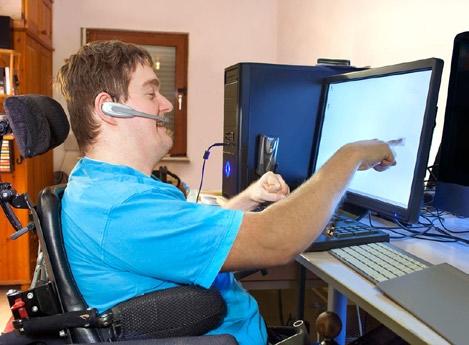
Read more about this project and its progress here: https://centreforcare.ac.uk/topics/digital-care/
On 2 June 2025, a major nationwide awareness campaign launched across TV, radio, social media and print - raising urgent public awareness about the UK’s digital landline switchover and the potential impact on telecare services.
The campaign has a clear, direct message:

Landline phone lines are switching to digital, which could stop telecare alarms working. If you or someone you know uses a telecare alarm, call the landline provider to keep it working.

This message is already reaching millions, with campaign bursts running throughout June. For TEC providers and alarm receiving centres, it marks a period of heightened demand, increased public queries, and growing need for calm, clear communication with service users.
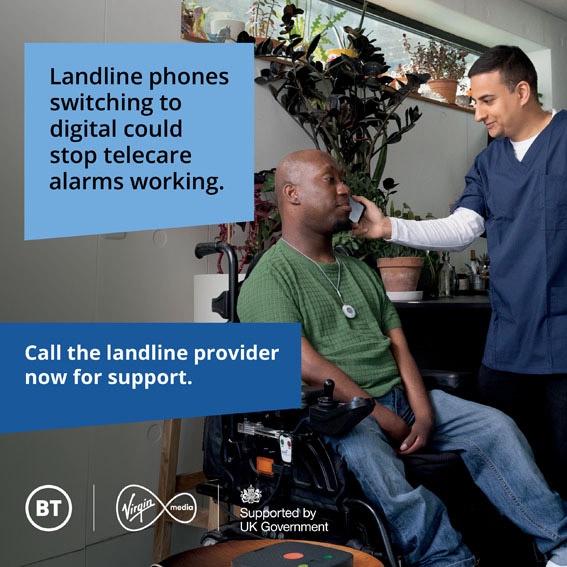

Created by telecoms providers in partnership with UK Government, we are helping to ensure that the messaging truly reflected the needs of telecare users and those who support them
Through our National Telecare Campaign Resource Hub, providers can access practical tools and ready-to-use materials to confidently respond to the surge in awareness and questions.
To further support the sector, TSA also hosted two dedicated briefing webinars for our members in early June, equipping frontline teams and managers with the knowledge and clarity needed to navigate the campaign period.
Available now, the Resource Hub includes:
• Campaign posters (including bilingual versions)
• Social media assets and suggested copy
• Campaign FAQs and talking points for staff
• Links to key campaign media, including the national TV advert
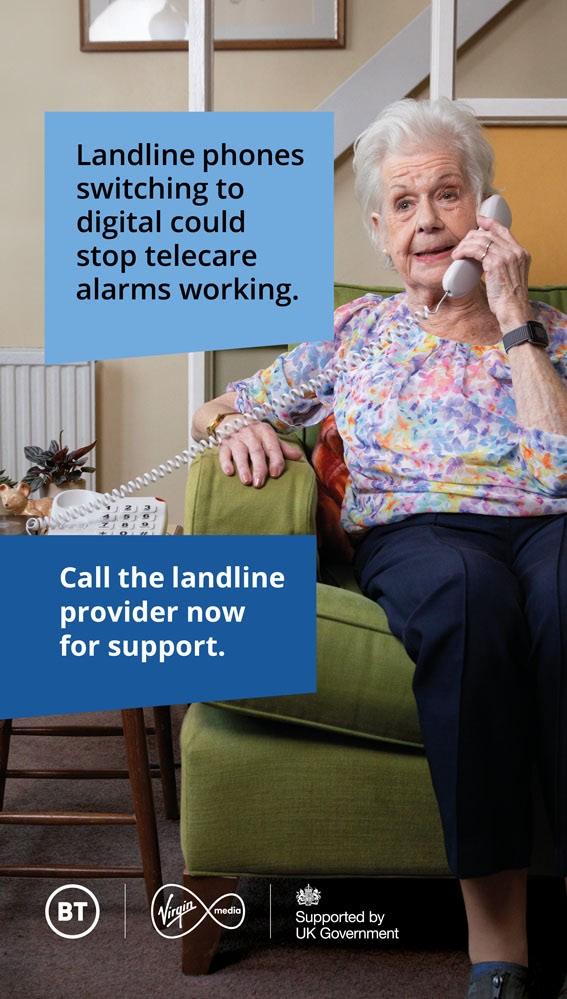
Visit the National Telecare Campaign Resource Hu b today and help us keep telecare users connected, supported and safe.
• Guidance on supporting service users and engaging their networks
All materials have been developed for consistency and accessibility, so they’re ready to use straight away, with no rebranding required.
The UK’s analogue telephone network will be switched off by January 2027. For most people, the move to digital will be seamless. But for those who rely on telecare alarms, it could be critical, unless action is taken.
The national campaign is designed to prompt that action. But awareness must be matched with support. That’s where the TEC sector comes in: helping users understand the change, feel safe, and take steps to protect their services.
Whether you’re a service provider, commissioner, housing organisation or technology supplier, here’s how you can get involved:
• Visit the Resource Hub and bookmark it for updates
• Display campaign posters where telecare users will see them: for example, community centres, GP surgeries, local cafes, and libraries.
• Use the social media materials to spread the word online
• Brief your teams using the available FAQs and guidance
• Encourage conversations with service users and families about telecare compatibility By working together, we can ensure that no one is left behind as the digital switchover gathers pace.
The UK Government’s Spending Review 2025 sets out new funding priorities for the next four years. While many headlines have focused on NHS budgets and council grants, we have looked at the developments directly relevant to the Technology-Enabled Care sector, including funding for digital transformation, prevention-focused care, and improved interoperability across health and care systems.
The review confirms an expansion of digital funding:

The Better Care Fund (BCF) will rise to £5.621 billion for NHS contributions and £2.64 billion for local authorities in 2025-26.
The accompanying BCF policy framework will require:
• Focus on prevention and home-based
Stronger joint NHS-local authority care planning
• interventions
• including for TEC procurement
Adherence to national guidance and standards,
The Better Care Fund (BCF) will rise to £5.621 billion for NHS contributions and £2.64 billion for local authorities in 2025-26.

A Government goal is for all social care providers to achieve digital interoperability by the end of this Parliament. This will require integration with NHS, GP, and local authority systems, which is a key opportunity for TEC suppliers.
• billion in resource funding over this Parliament, with up to £10 billion earmarked for digital transformation.
The NHS in England will see an additional £29
As health and care systems evolve, technology must play a central, standards-driven role in delivering safe, effective, and person-centred services.
The Government is seeking to standardise procurement and technical expectations for sensorbased monitoring and home adaptations. We estimate that around 1.7 million people are already using such technologies in their homes. National guidance will aim to promote greater consistency and interoperability between devices and data systems –mirroring work already in progress by TSA
This will support the further rollout of single
• patient records, expansion of the NHS App to serve as a digital front door for people, and greater use of telehealth and remote triage tools.
The Government also plans a £1.9 billion cross-
• government digital package, including a £1.2 billion uplift to support AI, data platforms, and prevention technologies across public services.
For TEC providers, this signals strong ongoing demand for technologies that support remote monitoring, early intervention, and joined-up care planning. The stated aim is for all NHS Trusts and local authorities to eventually achieve full interoperability between their systems and care records, a move that aligns closely with TSA’s vision for integrated, proactive, and technology-enabled care.


The Disabled Facilities Grant will increase to £711 million, an uplift of £86 million. This directly supports adaptations that help people live independently, often incorporating TEC such as:
• Personal alarms
Environmental controls
• Smart monitoring devices
• Such adaptations will play an increasingly important role as part of wider home-first and community-based care strategies.
In parallel, an independent commission on adult social care, chaired by Baroness Casey, will report in 2026. It will examine reforms aimed at delivering a more integrated and preventative care system, where technology will inevitably play a significant role.
For the TEC sector, the Spending Review confirms:
Growing Government emphasis on prevention
and care closer to home
Expanded digital budgets that support remote
care and monitoring
Moves toward • national standards and interoperability for TEC products
• independent living
Continued investment in adaptations and
• sharing
A push for more joined-up care records and data
These trends create both opportunities and responsibilities for TEC providers. As health and care systems evolve, technology must play a central, standards-driven role in delivering safe, effective, and person-centred services.

Tim Mulrey
Lead Advisor Analogue to Digital, TSA
In September 2024, Virgin MediaO2 notified TSA and other industry stakeholders of plans to impose a roaming restriction on its 2G network, effective October 1st, 2025. This restriction would block Telecare SIMs from accessing roughly one-third of the UK’s cellular networks, leading to a substantial amount of Telecare alarms being unable to connect to their Alarm Receiving Centre in a critical emergency.
TSA’s Transformation & Strategy Lead, Tim Mulrey, shares his views on the current work plans in place to support TEC services mitigate risk & what steps they should be taking ahead of the 1st October 2025 deadline.
What were your initial thoughts when you heard the announcement?
“The initial impact of this announcement was significant and left Telecare industry stakeholders stunned – mobile network operators had previously communicated that 2G networks would not be impacted until at least 2028 and this news was extremely concerning. However, following the webinar TSA hosted in January 25, we have seen
positive progress over the past 6 months, with stakeholders across the sector working together to identify the actual impact of the closure.”
What are TSA doing to support the sector ahead of the network closure on 1st October?
“Our response has focused on three main objectives. First, to thoroughly assess the impact of the proposed VMO2 restriction on Telecare users across the UK; any disruption to these critical services threatened the safety of individuals. Second, to establish robust oversight mechanisms designed to prevent or delay the restriction if it jeopardised service continuity for those at risk. Third, to ensure that mitigating this issue would not impede the ongoing digital switchover, preserving sector momentum.”
Make contact with TSA, as we can look at your current 2G estate and provide support to help you put a plan in place.
What is your advice to TSA Services that you want to share?
“My advice to all TEC services would be to please;
Speak with your TEC partner/Supplier and ensure • you understand their plans for any existing 2G TEC devices you currently have deployed.
Have a plan in place for any 4G TEC devices • and have a understanding on when they will be VOLTE/VOIP enabled.
Make contact with TSA, as we can look at your • current 2G estate and provide support to help you put a plan in place”
If you wish to speak to a member of the TSA team in terms of your organisation plans ahead of the VM02 2G closure, please reach out via ALLIP@tsa-voice.org.uk
A new report from Parliament’s Public Accounts Committee, titled ‘Government’s relationship with digital technology suppliers’ has highlighted significant challenges - and major opportunities - in the UK government’s use of digital technology suppliers. While the report focuses broadly on digital procurement and capability, its findings have important implications for the future of technology enabled care.
The report makes it clear that the UK’s digital infrastructure - and the way it engages with suppliers - needs urgent attention.
With public services increasingly reliant on connected, data-driven care models, reforming the way digital solutions are procured and deployed will be critical. Below, we explore three key takeaways from the report and what they mean for the TEC sector.
The report reveals that while the government spends over £14 billion a year on digital procurement, existing processes are too rigid and outdated to support fastmoving technologies - precisely the kind that underpin modern TEC solutions.
From AI-driven monitoring to cloud-based care platforms, innovative TEC services often struggle to gain traction through traditional procurement channels. Reforming these systems is essential if health and social care providers are to fully harness the potential of new care technologies at scale.
Another key finding is the critical shortage of digital skills across government departments, with just 15 experts overseeing major technical suppliers. This lack of digital literacy makes it harder to procure, deploy and manage complex TEC systems effectively.
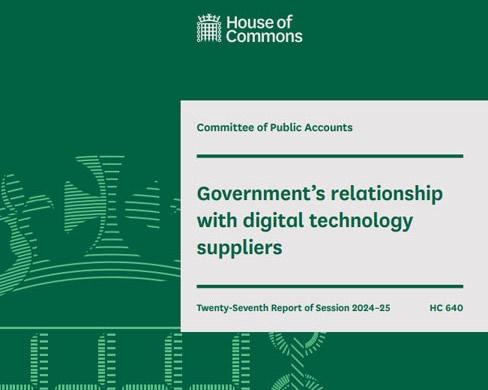
For technology enabled care to truly transform frontline services, public bodies must invest in developing the expertise needed to understand and leverage these tools - ensuring they are used to their fullest potential for patients and service users.
Encouragingly, the creation of a new Digital Commercial Centre of Excellence signals that government is starting to take digital transformation more seriously. This presents a clear opportunity for TEC providers to position themselves as trusted partners in this journey.
By showcasing how their solutions can deliver improved outcomes and greater efficiency across care services, TEC companies can play a leading role in shaping the future of digitally-enabled health and social care.
The Public Accounts Committee’s report makes it clear that the UK’s digital infrastructure - and the way it engages with suppliers - needs urgent attention. But for the technology enabled care sector, this isn’t just a challenge - it’s a moment of opportunity.
By aligning with the government’s renewed focus on digital reform and demonstrating the real-world impact of TEC solutions, the sector can help drive a new era of smarter, more responsive care. Now is the time for TEC providers, policymakers and commissioners to work together - removing barriers, building digital capability, and ensuring that innovative care technologies become the foundation of future service delivery.
